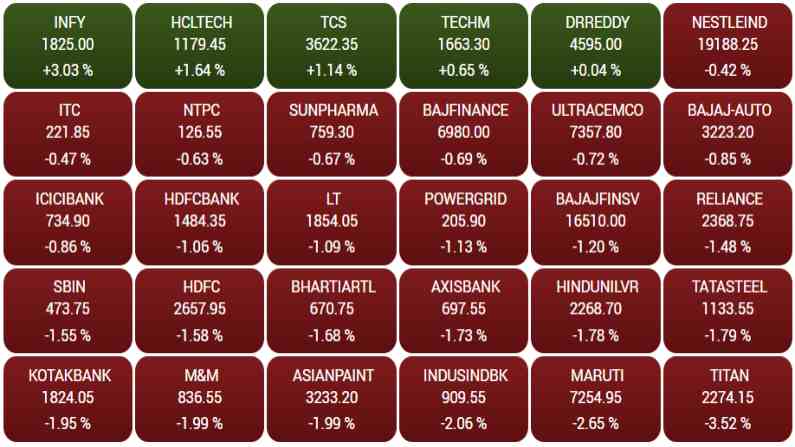Sensex tanks 511 points, Nifty nears 17,000; IT stocks zoom
In opening trades, Sensex slipped 511 points or 0.88% to 57,389. Similarly, Nifty was quoting at 17,084 plunging 163 points or 0.95%.

Taking cues from global cues domestic benchmark equity indices opened on a soft note. The downtrend came on the back of a decline in U.S. shares led by the technology sector as tightening monetary policy to fight inflation buffets investor sentiment. In opening trades, Sensex slipped 511 points or 0.88% to 57,389. Similarly, Nifty was quoting at 17,084 plunging 163 points or 0.95%.
“There are three major headwinds to the market now: the fast spreading Omicron variant, relentless selling by FIIs and hawkish central banks. The counterveiling tailwinds are the bulish DIIs and retail investors and the smart rebound in growth and corporate earnings. With the Bank of England becoming the first major central bank to hike rate yesterday, after the hawkish Fed stance, there is an increasing realization that inflation is turning more durable than thought earlier,” said VK Vijayakumar, Chief Investment Strategist at Geojit Financial Services.
The widening trade deficit and FII outflows have depreciated the INR, thereby improving the prospects for gold and IT companies. IT is well positioned to outperform the market, added Vijayakumar.
Gainers & losers

Top gainers & losers on the Sensex.
Sectoral strand
Among the sectoral indices, Nifty IT index was the lone range standing tall with gains of 1.78%. Whereas Nifty FMCG, Nifty Metal, Nifty Bank, Nifty Auto, Nifty PSU Bank, Nifty Pharma, Nifty Realty and Nifty Media indices in the range of 0.86-2.88%.
Broader markets
The broader markets mirrored the losses in the benchmark indices as the BSE MidCap index slipped 238 points or 0.95% to 24,911. While BSE SmallCap index was trading at 28,812 down by 234 points or 0.81%.
Bears had the markets in their grip as 1,850 shares declined compared to 950 advancing and 86 remained unchanged.
Global markets
Overseas, Asian stocks are trading mixed on Friday, following overnight losses on Wall Street. The Bank of Japan is due to announce its monetary policy decision today.
U.S. stocks slid on Thursday as weakness among large tech stocks dragged down major market averages.
President Joe Biden signed a debt ceiling increase into law Thursday, ensuring the U.S. will not default on its debt for the first time ever. The measure lifts the government’s borrowing limit by $2.5 trillion, which is expected to allow the U.S. to cover its obligations into 2023.
The Bank of England hiked interest rates on Thursday for the first time since the pandemic started. It raised its main interest rate from a historic low of 0.1% to 0.25% amid mounting inflation pressure.
The European Central Bank further cut its bond purchases overnight but vowed to continue its unprecedented monetary policy support for the eurozone economy into 2022. It left the benchmark refinancing rate unchanged at 0%, while the rate on its marginal lending facility remained at 0.25%.
Download Money9 App for the latest updates on Personal Finance.
Related
- देश का विदेशी मुद्रा भंडार 4.47 अरब डॉलर घटकर 688.1 अरब डॉलर पर
- मौद्रिक नीति पर निर्णय से पहले सेंसेक्स 308 अंक टूटा, निफ्टी भी नुकसान में
- जी एंटरटेनमेंट के शेयरधारकों ने प्रवर्तक संस्थाओं से 2,237.44 करोड़ जुटाने के प्रस्ताव को किया खारिज
- 15 जुलाई तक मक्का, धान की फसलों का बीमा कराएं किसान: हमीरपुर जिला अधिकारी
- सेंसेक्स की शीर्ष 10 कंपनियों में से नौ का बाजार पूंजीकरण 2.34 लाख करोड़ रुपये बढ़ा
- नेस्ले इंडिया के निदेशक मंडल के 1:1 बोनस शेयर जारी करने को दी मंजूरी दी

